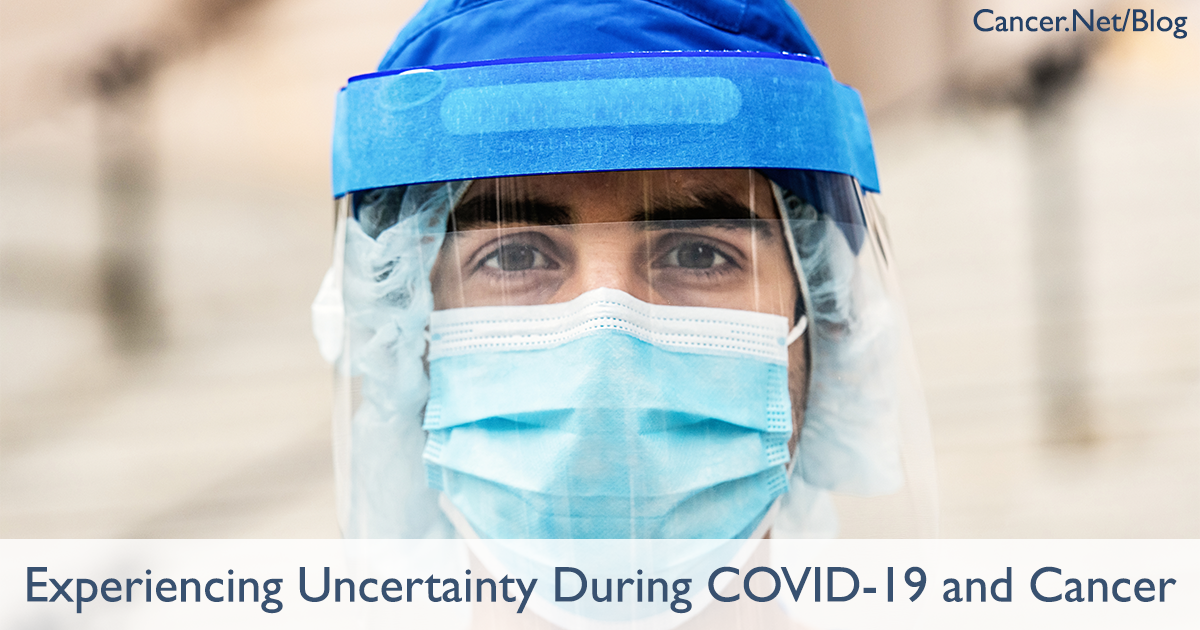
Anthony F. Provenzano, MD, is a practicing medical oncologist at New York-Presbyterian Lawrence Hospital located in Bronxville, New York. He received his medical degree from Cornell University Medical College and has been in practice since 1981. Dr. Provenzano is a member of the American Society of Clinical Oncology (ASCO) Clinical Practice Guideline Committee and is also a member of the Cancer.Net Editorial Board.
The COVID-19 pandemic has resulted in uncertain times. It has affected people in many ways, leading to fear, confusion, anxiety, and, in some cases, depression. And people with cancer have been particularly susceptible to these effects. As an oncologist in New York, I share those feelings. I’ve had to deal with shifting and conflicting directions from government and public health officials, who were just as blindsided by the pandemic. This has been a roller coaster health care crisis that we were all ill-prepared to handle. Like a tsunami, this pandemic hit us all—both patients and health care providers alike. As frontline first responders and other health care workers tried to sort things out, we were left standing on the shore looking inland, realizing that the damage had already begun.
Some of my patients developed COVID-19 while they were in the middle of life-saving cancer treatments, be it chemotherapy, radiation therapy, or immunotherapy. Thankfully, all of my patients recovered, and some of them were able to resume their planned cancer treatment. Others could only resume part of their treatment, had to modify their treatments, or had to stop treatment entirely.
Coordinating care during the pandemic has been—and still is—challenging. But I am thankful for the technology that has allowed us to continue to deliver care to our patients. The accelerated use and acceptance of telehealth visits has allowed me to video chat or chat over the phone with patients who I couldn’t see in person during the height of the pandemic. Eventually, as doctors were allowed to see patients in their offices and clinics, we combined virtual visits with in-person visits. This combination of treatment has allowed us to lower the risk of COVID-19 while still ensuring the health of our patients. I believe virtual visits are here to stay, and the pandemic just sped up the process of allowing us to experience the benefits of this technology.
In the early part of the pandemic, I participated in an ASCO webinar focused on developing new guidelines on how treatment would have to change for people with preexisting cancer or newly diagnosed cancer during this health crisis. These changes tried to adapt to the rapidly moving target of a virus that was unprecedented both in the United States and worldwide. Our recommendations depended on whether we were in a pre-surge, early surge, or peak surge of the novel coronavirus. These guidelines were an attempt to put some order into the way we would address COVID-19 and cancer. For the oncologists making these decisions, we depended on our past experiences and our expertise in treating cancer, but these were new frontiers for even the best experts in the field. We are still in a time of uncertainty. We have yet to learn what the long-term outcomes of these actions and COVID-19 will be, and we are always learning new things about this virus.
I’ve seen many people with cancer who have been shell-shocked by the pandemic and who have been afraid to go to visits and follow up with their oncologists, even after public health officials gave them permission. Now, as we continue to learn how to navigate the pandemic, many people fear resuming normal follow-up visits for cancer surveillance and cancer screening. It is important that we continue these activities, even during the pandemic, because early detection can lead to more successful cancer treatment. These concerns about COVID-19 are normal and understandable. Discuss your fears and anxieties with your oncologist or other doctors, so your questions can be answered and your care can continue in the safest possible way.
As the COVID-19 pandemic continues, know that there are resources to help you cope. You can make use of online and in-person mental health resources. Nowadays online therapy is an option for mental health support. The Centers for Disease Control and Prevention (CDC) website, offers advice on how you, your family, and your community can cope with stress during the pandemic, including stress from the loss of a job, changes in sleep, worsening of mental health, and increased use of alcohol or other substances. Cancer.Net has extensive resources discussing how COVID-19 impacts people with cancer and survivors. Be sure to talk with your health care team about what other resources may be available to you during the pandemic.
The COVID-19 tsunami has hit, but I hope that the lessons we learn now will better prepare us for future public health crises like this one.




